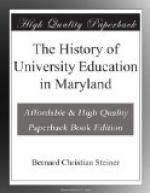“We prohibit play in the strongest terms, and in this we have the two greatest writers on the subject that, perhaps, any age has produced (Mr. Locke and Mr. Rousseau) of our sentiments; for, though the latter was essentially mistaken in his religious system, yet his wisdom in other respects and extensive genius are indisputably acknowledged. The employments, therefore, which we have chosen for the recreation of the students are such as are of greatest public utility:—agriculture and architecture.
“In conformity to this sentiment, one of the completest poetic pieces of antiquity (the Georgics of Virgil) is written on the subject of husbandry; by the perusal of which and submission to the above regulations, the students may delightfully unite the theory and practice together.”
There is something extremely ludicrous in the idea of making the average student delight in spending his leisure hours in farming, by means of a study of the Georgics in the original. But we can hardly laugh at these men, they were too much in earnest. To return to the circular, “The four guineas a year for tuition, we are persuaded cannot be lowered, if we give the students that finished education, which we are determined they shall have. And, though our principal object is to instruct them in the doctrines, spirit, and practice of Christianity, yet we trust that our college will, in due time, send forth men that will be a blessing to their country in every laudable office and employment of life, thereby uniting the two greatest ornaments of human beings which are too often separated: deep learning and genuine piety.”




